Highlights from the 2018 Culture of Health Conference
December 20, 2018 | Community News, Community News and Media
Thank YOU for Making the Building a Culture of Health in New Jersey Conference a Success – See You Next Year!
The New Jersey Partnership for Healthy Kids (NJPHK) co-hosted the Building a Culture of Health in New Jersey: Thriving Communities Transform Lives Conference on Wednesday, November 30th at The Palace at Somerset Park in Somerset, NJ.
“Building a Culture of Health in New Jersey means creating changes that will surround kids and families in every community with opportunities to make healthy choices.”
2018 Conference Addressed Community Trauma and Adverse Childhood Experiences
In New Jersey, 41% of children from newborns through age 17 have experienced one or more adverse childhood experiences (ACE); 18% have had two or more. These experiences include the death or incarceration of a parent, witnessing or being a victim of violence or living with someone who has been suicidal or had a drug or alcohol problem. Research shows a direct link between childhood adversity and the adult onset of chronic disease, mental illness and violence. Addressing community trauma requires attention at a population level and consideration of what can be done to prevent trauma in the first place.
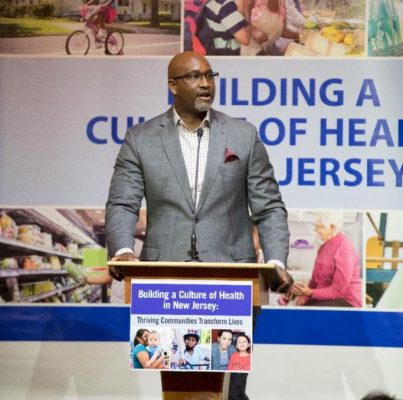 Anderson Kicks Off Conference
Anderson Kicks Off Conference
Dr. Darrin Anderson, Executive Director of The NJ YMCA Alliance, kicked off the event attended by nearly 500 public health professionals, social workers, educators, dietitians, and community leaders from across the state. Anderson lauded attendees for their partnership and commitment and advised them to “Share scalable solutions that address adverse community experiences and community-specific barriers that prevent communities from thriving.” Anderson advised that the conference was an opportunity to hear first-hand from various experts about the progress being made in our communities toward building a culture of health as it relates to trauma.
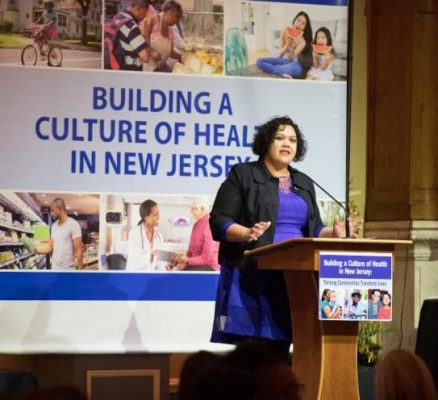 Paloma Cites Some Progress in Creating Health Equity
Paloma Cites Some Progress in Creating Health Equity
Marjorie Paloma, Robert Wood Johnson Foundation Senior Program Officer and Director, told conference attendees that to make New Jersey the healthiest state it can be, we must address health equity. She highlighted laws and funding expansions that offer some hope in achieving parity, among them: paid sick leave, tax credits for families with health issues, expanded pre-school funding, greater support for working families, and protecting beaches from tobacco smoke. She also focused on the “inspiring story” of Patterson, New Jersey, and the impact of 70 non-profit partners that are putting health equity at the center of their efforts. To date, they’ve achieved a decrease in uninsured children and increased reading levels. Click here to hear remarks.
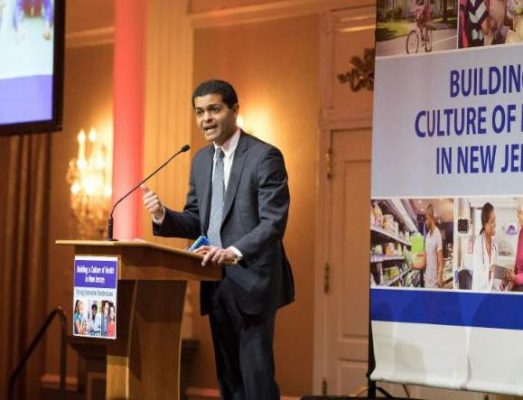 Health Commissioner Stresses Criticality of Prevention
Health Commissioner Stresses Criticality of Prevention
Dr. Shereef Elnahal, Commissioner of the NJ Department of Health, emphasized the need to invest in prevention to improve health and wellness throughout the state, particularly in regard to opioid dependence, women’s health, and children living with ACEs (adverse childhood experiences). “Health care systems only get us so far,” Elnahal explained, “New Jersey must focus on disparities in health and closing the gaps across the state.” New Jersey is among the worst states in the U.S. when it comes to maternal mortality, where African-American women face four-times the risk of other races. Children also face serious mental health risks when they are exposed to ACEs, making health a social justice issue. Click here to view Dr. Elnahal’s remarks.
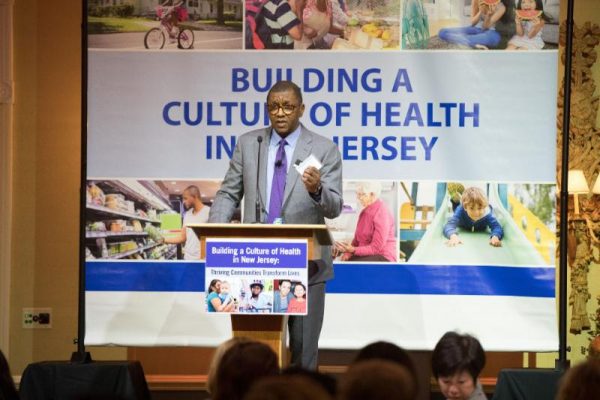 Keynote Speaker Dr. Howard C. Stevenson: “Racial Trauma Is Trauma Too”
Keynote Speaker Dr. Howard C. Stevenson: “Racial Trauma Is Trauma Too”
Dr. Howard C. Stevenson–Professor, Author, Community Thought Leader, and Director, Forward Promise–used an African proverb to underscore the difference point-of-view makes in understanding and addressing racial trauma. “A lion’s story will never be told as long as the hunter is the one to tell it,” said Stevenson. There is not an “either/or” way to look at an issue; both perspectives must be sought and respected.” When faced with racially stressful encounters, Stevenson advocates a strategy of “read, recast, resolve.” He talked about the power of face-to-face intervention within a community as an alternative to systemic intervention. Barbershops and faith communities can be healing centers for people of color. Stevenson said we should equip the environments in which people feel comfortable with mental health and other resources-reaching people where they live. Click here to view Dr. Stevenson’s keynote address.
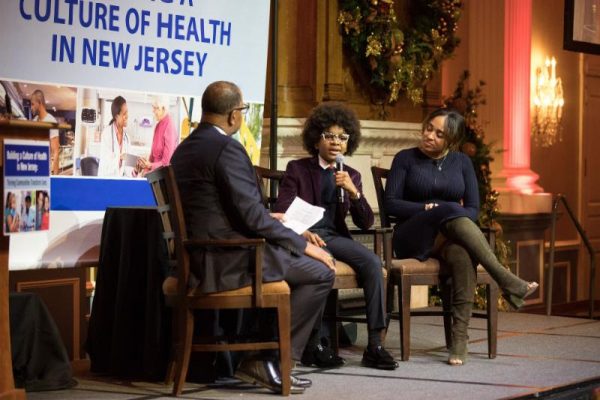 Entrepreneurs Mr. Cory and Cookie Mom: “You Can’t Go Anywhere Without Help”
Entrepreneurs Mr. Cory and Cookie Mom: “You Can’t Go Anywhere Without Help”
Those looking for inspiration at the conference no doubt found it in the story and ebullience of Cory Nieves, aka Mr. Cory, and his mother, Lisa Howard, aka Cookie Mom. Both were interviewed by NJTV Reporter, Michael Hill, and talked about how they managed to turn adversity into opportunity. Cory’s passion, combined with a love of treats and his entrepreneurial spirit, led him to be the owner of Mr. Cory’s Cookies. He also leads a foundation, Mr. Cory Cares, and recently was awarded with the Diana Award, established in memory of Diana, Princess of Wales, the most prestigious accolade a young person aged 9-25 years can receive for their social action or humanitarian work. Click here to view the interview.
Culture of Health Champions Recognized for Outstanding Efforts
During the conference, Culture of Health awards were presented in recognition of organizations and individuals who are committed to creating changes that surround individuals and families with opportunities to make healthy choices.
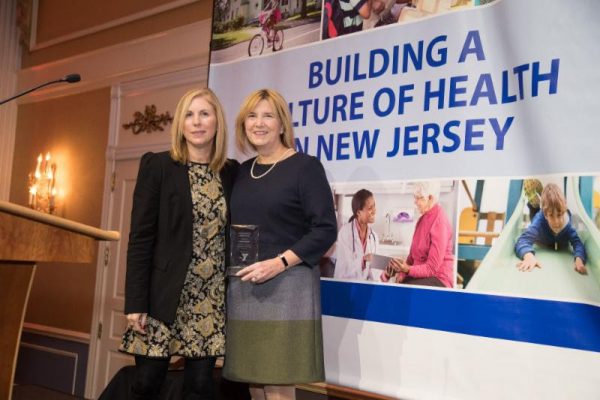 CULTURE OF HEALTH CHAMPION Cathleen Bennett, CEO of the New Jersey Hospital Association
CULTURE OF HEALTH CHAMPION Cathleen Bennett, CEO of the New Jersey Hospital Association
Peri Nearon, Director of External Affairs & Strategic Initiatives for NJ Department of Health, presented a Culture of Health Champion Award to Cathleen Bennett(right). Bennett is a longtime advocate of healthy communities and has been committed to building a culture of health through community change, collaboration and prevention. During her tenure as Commissioner of Health, she supported statewide endeavors to improve health and health outcomes through policy, environment and system change. She created an Office of Population Health to promote stronger collaboration among hospitals, local health departments and healthcare providers. She convened an unprecedented Population Health Action Team, which brought eight state departments together to strategize on how to improve health in all policies. Under her leadership, Cathleen launched the first Department of Health Population Hero Awards Programs.
Cathleen Bennett accepted the honor saying the award “recognizes not what I have done but what all of you have done.”
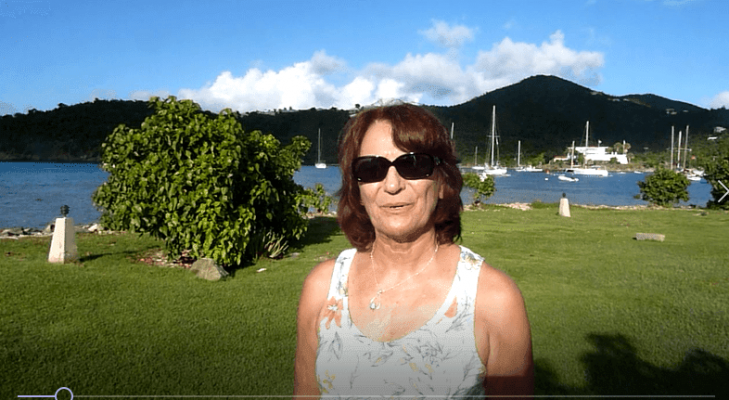 CULTURE OF HEALTH CHAMPION Jackie Malaska, former Executive Director of the NJ Association for Health, Physical Education, Recreation and Dance (NJAHPERD)
CULTURE OF HEALTH CHAMPION Jackie Malaska, former Executive Director of the NJ Association for Health, Physical Education, Recreation and Dance (NJAHPERD)
Diane Hagerman, Deputy Director Programs for New Jersey Health Initiatives presented a Culture of Health Champion Award to Jackie Malaska. Malaska has devoted herself to the promotion of a healthy, active lifestyle as a teacher, coach, mentor and leader. She is a committed partner and champion of children and their health. As Executive Director, she established NJAHPERD as the “go to” expert for health education, physical education and physical activity. Through her collaboration with Safe Routes to School/ Rutgers Voorhees Transportation Center, and funding through the NJ Healthy Communities Network, students in five elementary schools participate in on-bike training and nutrition education. Along with the NJAHPERD Advocacy Committee, Malaska takes special pride in the recently passed legislation mandating a minimum 20- minute recess for elementary students. She recently was inducted into The College of New Jersey “Alumni Wall of Fame.”
Malaska accepted the award via video from St. John saying the “recognition is for the 2,000 members of NJAHPERD who advocate for our students and children.”
Thanks to Our Conference Sponsors!
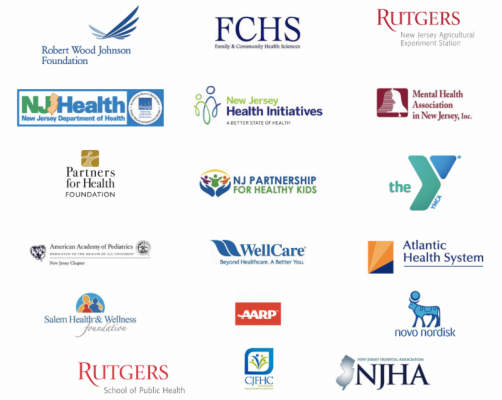
In The News
NJTV Coverage: Childhood trauma linked to health issues later in life
SHARE:
Contact Us: 609-278-9622
Follow Us On: